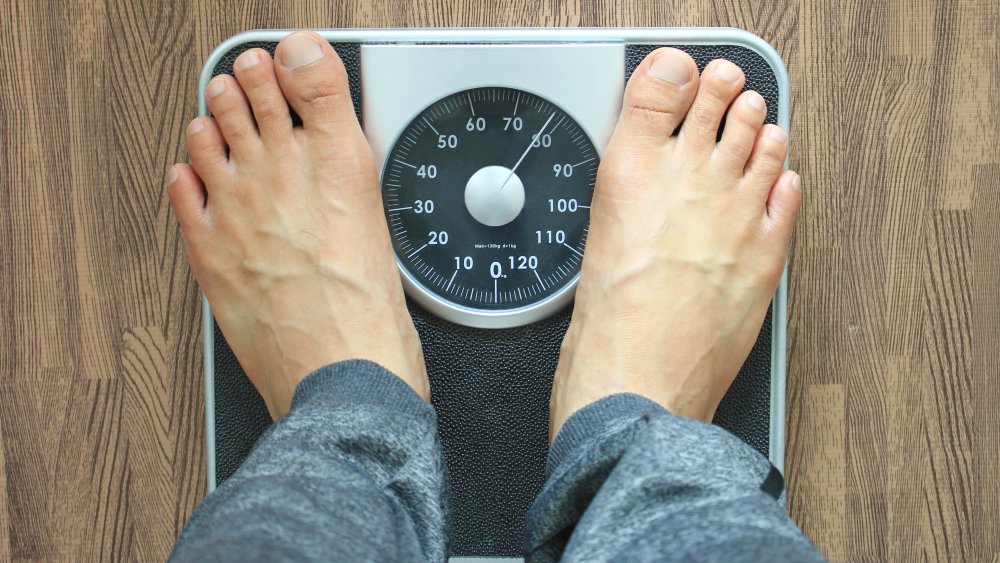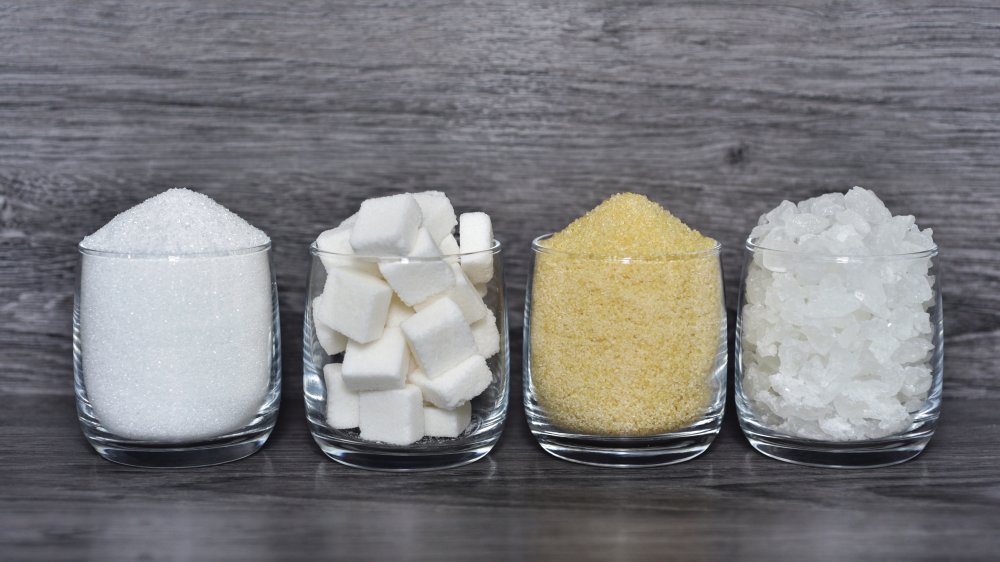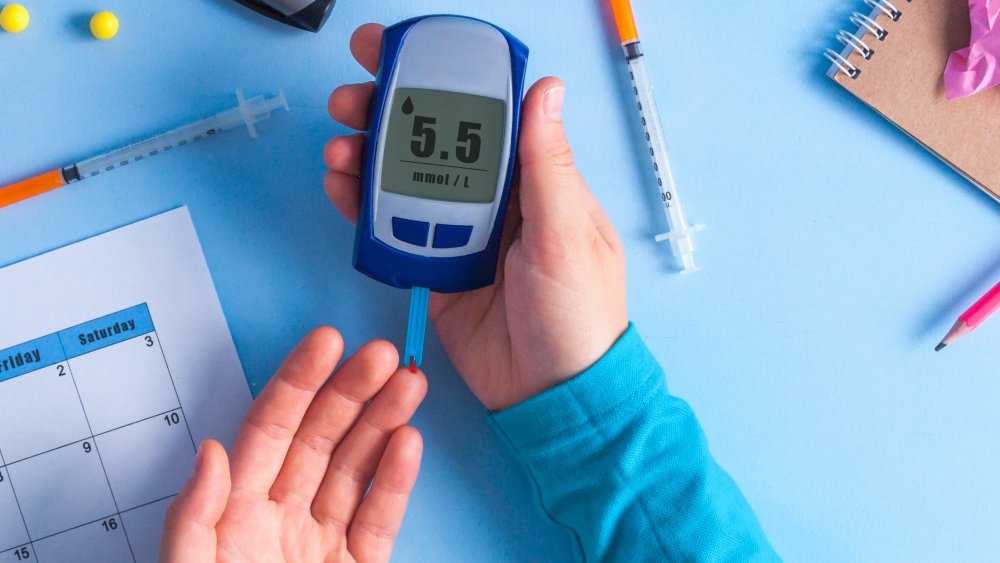When You Drink Diet Coke Every Day, This Is What Happens To Your Body
Almost half of Americans drink diet soda every day, according to a Gallup poll (via Fox News). These days, Americans are also more health-conscious. With the rise of wellness drinks like celery juice and kombucha plus a multitude of boutique fitness studios and far too many health blogs to even try to keep track of, it's no wonder that people are taking notice of what they put in their bodies. Still, even when you may think you're making a healthy choice, that may not be the case. Enter: Diet Coke.
You might assume that Diet Coke is better than regular Coca-Cola, especially if you're trying to cut back on drinking too much regular soda. Despite it's zero calories, though, it can still harm your body in a multitude of different ways. Thanks to the artificial sweeteners and other ingredients contained within each can, this is what happens to your body when you drink Diet Coke every day.
Drinking Diet Coke every day could lead to developing metabolic syndrome
If you look at the ingredients list on a can of Diet Coke, you may be a little shocked at just how many components you can't even pronounce. But, even if you have trouble saying it, an ingredient that is always going to be found in Diet Coke is at least one type of artificial sweetener. Traditionally, Diet Coke contains aspartame, though some versions contain Splenda (sucralose), according to Coca-Cola. After all, these artificial sweeteners are what make the diet drinks taste sweet without adding any calories.
According to Healthline, aspartame and sucralose are two of the most commonly used artificial sweeteners and while they and other artificial sweeteners have been deemed "safe" to consume, some people, revealed the Mayo Clinic, may experience adverse effects from the ingredients.
As some studies have shown (via Healthline), diet soda can potentially increase your risk of developing metabolic syndrome, which in turn increases your risk of developing heart disease. You may think the absence of sugar in soda to be a good thing, but that simply opens the door for artificial sweetener to be used in its stead.
You may actually gain weight if you drink Diet Coke every day
Many people give up their regular sodas and turn to Diet Coke as part of their efforts to lose weight. While it may make a difference if you switch from consuming numerous regular sodas a day to only diet ones, that isn't the only piece of the puzzle. In fact, there is mounting evidence that proves drinking Diet Coke every day can actually have an unintended result.
One study published in the Yale Journal of Biology and Medicine found that regular consumption of artificial sweeteners actually led to weight gain, not loss. Additionally, a report from the University of Texas at San Antonio concluded that diet soda plays a role in weight gain. By looking at the measurement of participants' waists, it was found that people "who reported occasional use — drinking less than one diet soda a day — waist circumference increased almost 2 inches." And people "who consumed diet sodas every day, or more often than once a day, waist circumference increased over 3 inches."
You'll crave more sugar when you drink Diet Coke every day
Artificial sweeteners definitely get a bad rap, but a lot of people still turn to them to help them stop consuming so much sugar. While artificial sweeteners, like the ones found in Diet Coke, may not have any calories, they can make you crave more sugar.
According to the Yale Journal of Biology and Medicine, "artificial sweeteners, precisely because they are sweet, encourage sugar craving and sugar dependence." So if you are trying to cut back on sugar, Diet Coke probably isn't the way to go about it. Additionally, Frank Lipman, physician and expert in functional and integrative medicine, wrote for Well+Good that "the taste of sweet — be it artificial or actual sugar — appears to play a significant role in increasing appetite" in general.
Artificial sweeteners increase your cravings, especially for sweets. As such, drinking even just one Diet Coke every day could cause you to want even more sweets and for anyone trying to get healthy, that's pretty much the last thing they'd want to be craving.
You'll be at an increased risk of diabetes if you drink Diet Coke every day
According to the Centers for Disease Control and Prevention, over 30 million Americans have diabetes and there are even more citizens who are considered prediabetic. Although common, diabetes can be a debilitating illness. And, if you drink Diet Coke every day, you're sadly at an increased risk of developing the disease during your lifetime.
According to Healthline, "Although diet soda has no calories, sugar or fat, it has been linked to the development of type 2 diabetes." Specifically, one study from the Center for Research in Epidemiology and Population Health in France found that the consumption of artificially sweetened beverages "were associated with increased [type 2 diabetes] risk." Diet coke may be advertised as a healthy alternative to regular soda, but given its link to the metabolic disease in those who drink it regularly, it really shouldn't be portrayed as healthy at all.
Drinking Diet Coke every day can mess with your gut health
The term "gut health" has become somewhat of a buzzword that people throw around. Everyone you know is probably concerned about their gut health, but is it really that important? Well, as it turns out, it is. According to WebMD, your gut health impacts your whole body, including your mental and physical well-being. That said, if you drink Diet Coke every day, you aren't doing your gut health any favors.
As Frank Lipman, physician and expert in functional and integrative medicine, explained in an article for Well+Good, artificial sweeteners actually "alter the microbiome and can kill off good bacteria in our gut."
Specifically, a 2014 study by researchers in Israel found that the "consumption of commonly used NAS [non-caloric artificial sweeteners] formulations drives the development of glucose intolerance through induction of compositional and functional alterations to the intestinal microbiota." In layman's terms, diet soda messes with your gut health and, in doing so, causes glucose intolerance, like prediabetes and diabetes.
Drinking Diet Coke every day can cause hypertension
Though high blood pressure, or hypertension as it is also known, may be common — over 100 million Americans suffer from hypertension, according to the American Heart Association — that doesn't mean it isn't dangerous. As the Mayo Clinic explained, "High blood pressure is a common condition in which the long-term force of the blood against your artery walls is high enough that it may eventually cause health problems, such as heart disease." As if that weren't scary enough, drinking a Diet Coke every day may actually cause high blood pressure.
A 2016 study from the Department of Food and Nutrition at Kyung Hee University in South Korea found that "high SSB [sugar-sweetened beverages] and ASB [artificially sweetened beverages] consumption is associated with an increased risk of hypertension." Additional studies have also found that drinking artificially-sweetened beverages such as Diet Coke can lead to hypertension.
You may increase your risk of having a stroke if you drink Diet Coke every day
Nearly 140,000 Americans die from a stroke each year, according to the Centers for Disease Control and Prevention. Strokes are a serious health matter and, naturally, most people would do everything they could to help prevent them. However, when you drink Diet Coke every day, you are actually increasing your risk for a stroke.
As Healthline reported, "Observational studies have linked diet soda to ... an increased risk of stroke." But because "there's a lack of research on possible causes for these results," the link could be "due to preexisting risk factors such as obesity."
Nevertheless, a study from the Keele Cardiovascular Research Group at Keele University in South Korea found there was "an association between consumption of sugar-sweetened and ASBs [artificially-sweetened beverages] and cardiovascular risk." If you enjoy a Diet Coke on the regular, you may want to think twice the next time you go to pop one open.
When you drink Diet Coke every day, you risk getting headaches
Even though headaches are a common condition, no one would want to get a headache if they could help it. Unfortunately, there are a lot of things that can trigger headaches, like certain foods and drinks. While everyone is different when it comes to their dietary triggers, you do risk getting a headache when you drink Diet Coke every day.
"I have several clients who used to suffer from migraines and pinpointed their cause to diet soda," Minnesota-based dietitian Cassie Bjork told Health. On top of that, esteemed neurologist Orly Avitzur told Business Insider that diet sodas "offer little nutritional benefit, and in some cases, diet sodas can cause headaches or make you overeat."
One older study found "that aspartame may be an important dietary trigger of headache in some people." Given that study was from the late '80s, more modern evidence is needed to truly prove that as fact. Still, there is plenty of anecdotal evidence that Diet Coke causes headaches, which may encourage many to stay away.
You damage your kidneys when you drink Diet Coke every day
It's no secret that Diet Coke comes with a lot of baggage for your health. But while most of the issues people have with Diet Coke can be ignored, the fact that it can be terrible for your kidneys is too important to miss. As Today reported, a study from Harvard Medical School found that "diet cola is associated with a two-fold increased risk for kidney decline."
Additionally, Kidney.org reported that another study uncovered that "Kidney function declined over two decades in women who drank several diet sodas a day, according to researchers." But that's not all. Another study found that "Diet soda consumption was associated with higher ESRD (end-stage renal disease) risk."
There is mounting evidence that seemingly proves Diet Coke leads to poor kidney health. When you drink diet soda every day, you aren't doing your body any favors — especially those kidneys. That said, it's probably best to steer clear of the bubbling beverage as kidney failure is no joke.
If you drink Diet Coke every day while pregnant, you may go into labor early
There are seemingly a million restrictions when it comes to what pregnant women should eat and drink — as well as what they shouldn't eat and drink. While a soda or coffee here or there is not likely to be harmful, drinking diet soda while you're pregnant could actually cause you to go into early labor.
Preterm labor is associated with a number of risks. According to Stanford Children's Health, premature babies may have trouble breathing, kidney problems, and seizures. While it may seem almost unbelievable that a beverage could cause preterm labor, more than one study has uncovered a link between diet soda consumption and early labor.
One, from the Centre for Fetal Programming at the Statens Serum Institut in Denmark concluded there was "an association between intake of artificially sweetened carbonated and noncarbonated soft drinks and an increased risk of preterm delivery." Another, from the Department of Obstetrics and Gynecology at the Institute of Clinical Sciences in Sweden found that "a high intake of both AS [artificially-sweetened] and SS [sugar-sweetened] beverages is associated with an increased risk of preterm delivery." So, if you're pregnant, drop that Diet Coke.
Pregnant women who drink Diet Coke every day risk having babies who develop obesity
Childhood obesity, and obesity in general, has the potential to wreak havoc on a person's overall health. According to Stanford Health Care, "Obesity puts you at greater risk for type 2 diabetes, heart disease, high blood pressure, arthritis, sleep apnea, some types of cancer, and stroke." Sadly, drinking Diet Coke throughout pregnancy equals a strong chance the baby will develop obesity during infancy and childhood.
According to a study from the Department of Pediatrics and Child Health at the University of Manitoba in Canada, "maternal consumption of artificial sweeteners during pregnancy may influence infant BMI [body mass index]." Another study published in the International Journal of Epidemiology in 2017 revealed that there were "positive associations between intrauterine exposure to ASBs [artificially-sweetened beverages] and birth size and risk of overweight/obesity at 7 years." Though a diet soda might sound tempting when you're pregnant, research shows that it's probably not worth it.
Drinking Diet Coke every day increases your cancer risk
One of the most common gripes people have with Diet Coke is that it has the potential to cause cancer. And those concerns aren't unfounded. As Ermy Levy, a research dietitian in behavioral science at the University of Texas MD Anderson Cancer Center, explained, there is some evidence that "artificial sweeteners may increase your risk for certain cancers," such as bladder and urinary cancers. "That's not to say regular soda is better for you," Levy added. "They might be affecting our health or cancer risks in ways we don't yet know about," she concluded.
Additionally, more than one study has found a connection between regular consumption of diet soda and cancer. A study conducted by the Department of Clinical & Experimental Medicine at the Hospital School of Medicine in Italy found "a slight correlation between risk of pancreatic cancer and CSD [carbonated soft drinks]."
Another study by the Department of Medicine at Brigham and Women's Hospital and Harvard Medical School, uncovered "a detrimental effect of a constituent of diet soda, such as aspartame, on select cancers." Clearly, diet soda increases your risk factors — and the research on that link is just getting started.
There is a link between drinking Diet Coke every day and depression
Depression is a major issue not just for Americans, but people the world over. Some 322 million people around the world suffer from depression, according to the Anxiety and Depression Association of America. Unfortunately for those who drink Diet Coke every day, the beverage has been associated with the mood disorder.
As Lisa Young, an internationally-recognized nutritionist, wrote in an article for HuffPost, studies have "found an association between the two — soda drinkers were more likely to be diagnosed with depression." That isn't to say that diet soda causes depression, she explained, but there is a correlation.
According to a 2014 study published in PLOS One, "Frequent consumption of sweetened beverages, especially diet drinks, may increase depression risk among older adults, whereas coffee consumption may lower the risk." That said, you may want to consider switching out your daily Diet Coke for a cup of coffee.
Drinking Diet Coke every day can literally damage your cells
One of the most alarming and surprising possible side effects of drinking Diet Coke every day is that it actually has the ability to damage your cells. According to Today, most diet beverages contain one certain ingredient that regular sodas typically don't have: "mold inhibitors." Per Today, "they go by the names sodium benzoate or potassium benzoate." According to Coca-Cola, Diet Coke, Coca-Cola Zero Sugar, and several other products contain such "preservatives." However, they aren't great for you.
"These chemicals have the ability to cause severe damage to DNA in the mitochondria to the point that they totally inactivate it — they knock it out altogether," Peter Piper (no, not that Peter Piper), a professor of molecular biology and biotechnology at the University of Sheffield in the United Kingdom, revealed to a newspaper some time ago (via Today).
Although some companies took the initiative to stop using sodium benzoate, they merely transitioned to using other mold inhibitors, which still have the ability to damage DNA.













